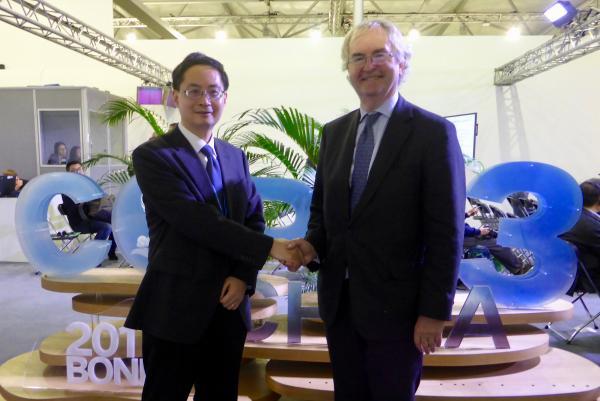
On the margins of the COP 23 climate talks in Bonn, the Green Finance Committee (GFC) of the China Society for Finance and Banking and the European Investment Bank (EIB) today launched a White Paper that provides an international comparison of several green bond standards. The new paper paves the way for enhancing the consistency of green finance definitions and standards between China and the EU.
Introducing the White Paper, Yin Yong, Deputy Governor of the People’s Bank of China (PBoC) said that “the report provides a basis for future international cooperation on improving green finance definitions and standards with a view to facilitating cross-border green capital flows”.
Key findings of the study were highlighted to global climate experts and representatives of the green bond community at COP 23 by Dr Ma Jun, Special Advisor to PBoC Governor and Chairman of China’s Green Finance Committee, and Jonathan Taylor, European Investment Bank Vice President responsible for Asia and climate action.
“Development of green finance is a priority for China and China is now the world’s largest green bond market. This year’s global green bond issuance will likely expand by about 40%, and may continue to grow rapidly in the many years to come. However, the lack of clear definitions in some markets and the lack of comparability of different definitions in different markets are barriers to future growth of the green finance market and green capital flows, so efforts need to be made to enhance the comparability and consistency between different standards. This White Paper reflects on the strategic partnership between China and the European Union to promote international cooperation in this area.” said Ma Jun, Special Advisor to PBoC Governor and Chairman of China’s Green Finance Committee.
“Strengthening investment in green finance is essential to support sustainable growth, improve environmental protection, and implement the Paris Agreement. The Green Finance White Paper published today will strengthen investor confidence and enhance transparency of green finance and follows months of technical assessment and market consultation by world-class experts.” said Jonathan Taylor, European Investment Bank Vice President.
The study compares different use-of-proceeds classifications under the Chinese Green Bond Endorsed Project Catalogue, the Eligibility Criteria of EIB’s Climate Awareness Bonds, the MDB-IDFC Common Principles for Climate Mitigation Finance Tracking, and identifies ways to improve comparability of disclosure and reporting. The study includes examination of sector definitions, environmental policy objectives and project eligibility criteria. The study draws from extensive discussions with market participants, including regulators, investors, securities firms, MDBs as well as other international financial institutions, external reviewers, and civil society representatives.
Over the last nine months experts from the Green Finance Committee of the China Society for Finance and Banking and the European Investment Bank have mapped and compared core standards for investments eligible for financing through green bonds.
“As signatories of the Paris Agreement, the European Union and China are committed to mobilising new climate related investment by enhancing capital market frameworks. As the Bank of the European Union the European Investment Bank is committed to supporting climate related investment both through our own financing and working with others to enhance overall green investment.” added Jonathan Taylor.
In March 2017 the People’s Bank of China and the European Investment Bank announced the establishment of a joint green finance initiative to translate green definitions between China and those in the European market. Such a translation can help avoid duplication of verification and certification, and assist in reducing costs of green bond issuance.
The Green Finance Committee of China Society for Finance and Banking was established in April 2015 with the approval of the People’s Bank of China. The committee is a non-for-profit professional organisation dedicated to research and coordination of green finance initiatives of member institutions.
As of October 2017, the Green Finance Committee had about 190 member institutions, including all major Chinese banks and many insurance companies, asset owners and managers, brokers, green companies, third party service providers and research institutions in the area of green finance. The financial assets under management of the member institutions amounts to RMB 120 trillion, accounting for roughly 70% of the total asset of China’s financial industry. The GFC promulgated China’s Green Bond Endorsed Project Catalogue (GB Catalogue) in December 2015.
The European Investment Bank is the world’s largest lender for climate related investment and pioneered the Green Bond market in 2007 by issuing the world’s first green bond. Since then the EIB has issued EUR 20 billion in Green Bonds, branded as Climate Awareness Bonds, across 11 currencies, making the EIB the world’s largest issuer of Green Bonds to date. EIB issuance of Climate Awareness Bonds in 2017 has already reached a record of EUR 4.3 billion.
The European Investment Bank has financed projects in China since 1995 and last year the European Investment Bank Group provided EUR 84 billion to finance new investment around the world, including EUR 19.6 billion for climate related investment.
The need for a common language in Green Finance
Background information:
Link to the new China Green Finance Committee and EIB joint White Paper.
http://www.eib.org/investor_relations/cab/taxonomy-white-paper/index
The European Investment Bank, the European Union’s long-term lending institution, is committed to supporting implementation of the Paris Climate Agreement and backing climate related investment around the world.
The EIB, active in more than 130 countries, is the world’s largest financier of climate related investment and largest single issuer of green bonds. A quarter of all EIB financing supports climate action and the EIB is committed to providing USD 100 billion for climate related investment in the five years upto 2020.
At COP 23 in Bonn, EIB climate experts, capital market practitioners, and senior management will highlight the EIB’s broad support for climate investment in diverse sectors, announcing a number of new policy initiatives and project investments. A regularly updated agenda of EIB events and contacts can be found here.

Photographer: Richard Willis ©EIB
Download original

Photographer: Richard Willis ©EIB
Download original

Photographer: Richard Willis ©EIB
Download original